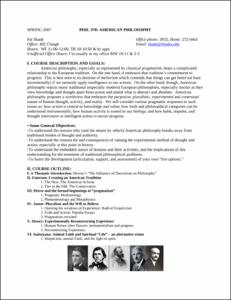Please use this identifier to cite or link to this item:
http://hdl.handle.net/10267/3523Full metadata record
| DC Field | Value | Language |
|---|---|---|
| dc.contributor.author | Shade, Patrick A. | - |
| dc.date.accessioned | 2009-02-27T17:40:46Z | - |
| dc.date.available | 2009-02-27T17:40:46Z | - |
| dc.date.issued | 2007-01-11 | - |
| dc.identifier.uri | http://hdl.handle.net/10267/3523 | - |
| dc.description | This syllabus was submitted to the Rhodes College Office of Academic Affairs by the course instructor. | en_US |
| dc.description.abstract | American philosophy, especially as represented by classical pragmatism, bears a complicated relationship to the European tradition. On the one hand, it embraces that tradition’s commitment to progress. This is best seen in its doctrine of meliorism which contends that things can get better (at least incrementally) if we earnestly apply intelligence to our actions. On the other hand, though, American philosophy rejects many traditional (especially modern) European philosophies, especially insofar as they view knowledge and thought apart from action and aimed what is abstract and absolute. American philosophy proposes a worldview that embraces the purposive, pluralistic, experimental and contextual nature of human thought, activity, and reality. We will consider various pragmatist responses to such issues as: how action is central to knowledge and value; how truth and philosophical categories can be understood instrumentally; how human activity is rooted in our biology; and how habit, impulse, and thought interweave in intelligent action to secure progress. • Some General Objectives: -To understand the reasons why (and the means by which) American philosophy breaks away from traditional modes of thought and authority. -To understand the reasons for and consequences of valuing the experimental method of thought and action, especially at this point in history. -To understand the embedded nature of humans and their activities, and the implications of this understanding for the treatment of traditional philosophical problems. -To foster the development (articulation, support, and assessment) of your own “live options.” | en_US |
| dc.language | English(United States) | - |
| dc.language.iso | en_US | en_US |
| dc.publisher | Memphis, Tenn. : Rhodes College | en_US |
| dc.relation.ispartofseries | Syllabi CRN | en_US |
| dc.relation.ispartofseries | 27303 | en_US |
| dc.rights | Rhodes College owns the rights to the archival digital images in this repository. Images are made available for educational use only and may not be used for any non-educational or commercial purpose. Approved educational uses include private research and scholarship, teaching, and student projects. For additional information please contact archives@rhodes.edu. Fees may apply. | - |
| dc.subject | Philosophy, Department of | en_US |
| dc.subject | Syllabus | en_US |
| dc.subject | Curriculum | en_US |
| dc.subject | Academic departments | en_US |
| dc.subject | Text | en_US |
| dc.subject | Academic departments | en_US |
| dc.subject | Text | en_US |
| dc.subject | Academic departments | en_US |
| dc.subject | Text | en_US |
| dc.subject | 2007 Spring | en_US |
| dc.title | PHIL 370-01, American Philosophy, Spring 2007 | en_US |
| dc.type | Syllabus | en_US |
| Appears in Collections: | Course Syllabi | |
Files in This Item:
| File | Description | Size | Format | |
|---|---|---|---|---|
| 2007_sp_PHIL_370-01_27303.pdf | 72.6 kB | Adobe PDF |  View/Open |
Items in DSpace are protected by copyright, with all rights reserved, unless otherwise indicated.